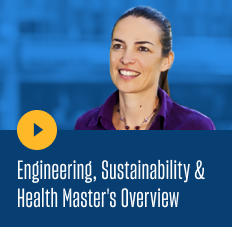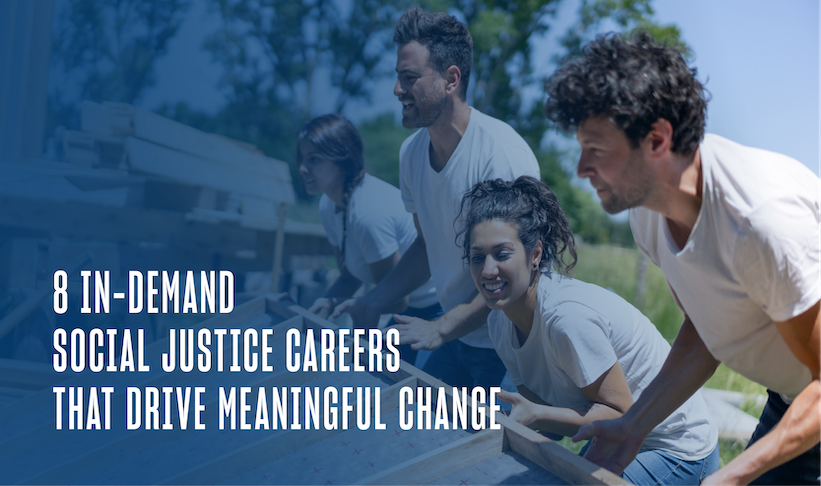So many of us search for professions that can offer meaning, satisfaction and fulfillment. This is why people around the world are increasingly re-evaluating their relationship to their work. What was initially thought of as a “Great Resignation” is actually more of a “Great Reflection” as the social upheaval of the post-COVID years has pushed millions of workers to find careers that align with their values to make a difference in the world.
For some, this may mean working to ensure fair and equitable access to healthcare; others work to support their immediate communities or design solutions to the challenges posed by climate change. For many, establishing a career that will allow them to make positive contributions while supporting themselves and their families can feel like a challenge.
In this article, we’ll explore a variety of meaningful jobs that make a difference, insights into what they involve, resources for landing them and the impact they create.
How Can Jobs Make a Positive Social Impact?
There are a multitude of ways that careers can make a difference in the world. Depending on your own personal values and passions, you could look into providing assistance in a specific area of need.
- Offer support for those with mental health and wellness issues. Some of the most vulnerable members of our communities struggle under the weight of trauma and disease. They lack the means, resources or knowledge on how to seek treatment and assistance, and so may require assistance.
- Work to alleviate the effects of poverty and hunger. In hard times, more and more families slip under the poverty line, which can leave them without necessities like food, heat or shelter. You may choose to find ways to provide local support or address the systemic issues that cause wealth inequality.
- Provide disaster relief to affected communities. Floods, fires, droughts and pandemics are a constant threat around the world, and such disasters are only going to increase in frequency and intensity due to climate change. New preventive measures need to be developed just as urgently as disaster response and recovery.
- Promote social justice and peaceful global relations. Too often it is minority or marginalized communities that suffer the most. Many people are underserved and discriminated against whether due to their race, religion, gender or some other form of identity. Advocating for understanding, communication and equity can help end persecution and forestall violent conflicts.
- Work to promote sustainable environmental development. Non-renewable resources and unlimited growth are short-sighted approaches to our current economic and environmental concerns. New technologies and innovative approaches to energy, water, waste and food are necessary if we hope to avoid future catastrophes.
Any of these directions are worthy of your time and effort, these are areas where you can find great success as a professional while working toward real positive improvements for people and communities. Furthermore, even if your job responsibilities don’t directly engage with a cause, you can leverage your position to provide assistance or raise awareness.
One example we’d like to highlight is that of Larry Lessard, a McGill University professor of Mechanical Engineering who is cycling around the world to promote ways to rethink and reuse composite materials. His hope is to raise awareness through his journey and to speak about sustainable development goals at different universities around the world. You can read more about this bold course of action at his Bike62 Project.
Join Us In the Fight Against Climate Change, Rising Inequity and Social Injustice — Download Meeting the Planet’s Most Urgent Challenges: Transforming Systems to Support Justice and Sustainability
Top 15 Jobs That Make a Difference
If you’re looking for more direction in exploring jobs or opportunities, then consider the following 15 career paths. Each can empower you to take action in an efficient and measurable way.*
Engineering
Engineering may not be the first profession you equate with positive change, but the reality is this industry has wide-ranging positive repercussions for all aspects of our society. From how cities are laid out to the development and utilization of resources, engineering drives much of who benefits and who misses out within modern society. For those looking to make positive changes at a foundational level, consider these engineering careers:
- Agricultural Engineer
Agricultural engineers address issues of production, development, processing and pollution in farming, aquaculture, forestry and food processing. Future work will depend on the development of alternative energies and biofuels, as well as efficient and sustainable food development.
Estimated annual median wage: $84,630 - Environmental Engineer
Environmental engineers address issues relating to recycling, waste disposal, public health and water and air pollution control. They draw upon principles of engineering, soil science, biology and chemistry to address environmental problems and improve environmental sustainability.
Estimated annual median wage: $104,170 - Civil Engineer
Civil engineers work in the public and private sector to plan, design and construct infrastructure projects such as roads, buildings, airports, tunnels, dams, bridges and water and sewage systems. Civil engineers may specialize as construction, structural or transportation engineers.
Estimated annual median wage: $95,890 - Hydrologist
Hydrologists study and analyze how water influences (and is influenced by) the surrounding environment. They work closely with engineers and scientists to solve problems concerning water quality and availability with the goal of better water supply management.
Estimated annual median wage: $92,060
Health
Perhaps no profession has been tested as much in recent memory as healthcare providers and practitioners. Though employment has mostly recovered from pre-COVID pandemic levels, the need for qualified, skilled and empathetic practitioners remains high. Health professionals provide assistance and service to all areas of a community, but most especially to those who are considered at-risk and vulnerable.
- Nurse
Nurses provide direct patient care in hospitals, clinics, schools, long-term care facilities and community settings. They assess patient conditions, administer treatments and medications, educate patients on health management, and coordinate with doctors and other healthcare professionals. Nursing offers many opportunities to impact patient outcomes and community health daily.
Estimated annual median wage: $93,600 - Occupational Therapist
Occupational therapists treat children, the elderly and patients with illnesses, injuries or permanent disabilities. Their goal is to assist patients in developing, recovering and maintaining the skills needed for daily living and working.
Estimated annual median wage: $98,340 - Community Health Worker
Community health workers develop strategies and create programs to teach people and communities about issues of wellness, including nutrition, self-care, mental health and disease awareness. They also advocate for the wellness needs of their communities, collect data about populations and perform outreach to neglected areas.
Estimated annual median wage: $51,030 - Epidemiologist
Epidemiologists investigate patterns and causes of disease and injury to find preventable and treatable options. They communicate their findings to health practitioners and policy makers to provide warnings, suggest best courses of action and promote effective treatments.
Estimated annual median wage: $81,390 - Environmental Health Specialist
Environmental health specialists study how environmental factors affect human health. They investigate potential health risks and then educate and provide guidance to government officials, businesses and the public about how to minimize impacts and improve both public and environmental health.
Estimated annual median wage: $85,278
Other Fields
Beyond engineering and health, there is a wide array of careers that prioritize positive work for both the environment and communities. These can be in private or public businesses, nonprofit organizations and educational institutions and are just a small sample of the more in-demand positions.
- Urban Planner
Urban planners work to identify community needs and develop short- and long-term solutions to improve and revitalize communities and areas. Their goal is to address economic, social and environmental issues within a community by presenting projects related to urban development, historical preservation and sustainable land use.
Estimated annual median wage: $81,800 - Chief Sustainability Officer
A chief sustainability officer (CSO) oversees the sustainability goals, strategies, policies and initiatives of an organization. These responsibilities can range from evaluating environmental impact and carbon footprint to improving working conditions and addressing social issues. The CSO determines how sustainability can be realized across departments and delegates responsibilities to specific teams.
Estimated annual median wage: $93,221 - Firefighter
Firefighters respond to emergencies including fires, medical crises, hazardous material incidents and natural disasters. They also perform rescues, provide first aid and educate communities on fire prevention and safety practices. Firefighters must be physically fit, able to work under pressure and committed to public service.
Estimated annual median wage: $59,530 - Teacher
Teachers are on the front lines of education, and often do much more than design and deliver lessons to students in K–12 classrooms or higher education institutions. They assess student progress, manage classroom environments, foster critical thinking and social development and adapt their instruction to meet diverse learning needs. Teachers play a central role in shaping the knowledge, skills and values of the next generation.
Estimated annual median wage: $63,980 - Conservation Scientist
Conservation scientists work with private landowners and federal, state and local governments to find ways to use and improve the land for agriculture. They also help control erosion, preserve water supplies and otherwise safeguard the environment.
Estimated annual median wage: $69,060 - Nonprofit Executive Director
Many nonprofit organizations offer services to members or a community as a supplement to aid and services provided by government and businesses. The executive director manages the people, property and assets of the nonprofit organization. They also help set goals, oversee fundraising and direct communications.
Estimated annual median salary: $80,200
Many of these careers require at least a bachelor’s degree, if not a master’s degree in a related field, depending on your specific position within an organization.
Of course, these aren’t the only jobs that would make the world a better place. You can achieve great things in fields such as education, public safety, counseling or childcare. However you choose to combine your skills and expertise with your passion, know that making positive changes on even a small, local scale is enough of a difference.
*All median wages sourced from the U.S. Bureau of Labor Statistics in November 2025.
Myths About Careers that Make an Impact
There has been a misperception, and in some cases outright misinformation, that careers that seek to help the public good are less desirable, or only for those who can’t land a “real” job.
The truth is:
- These careers pay well. As cited in the salary ranges above, the expected salaries for these types of social careers are well within, or above, the estimated median household income of $67,521 within the U.S. These are established careers with good incomes.
- These are not niche positions. From private corporations and national nonprofits to government agencies, these positions are in every major city and rural community.
- These careers are not just for activists or the young. One of the driving factors of the “Great Reflection” is that a growing number of established professionals are looking for ways of doing more for their communities and society as a whole.
- The level of burnout is no higher than other positions. The truth is you can expect challenges and stresses in any line of work. If anything, having a meaningful career helps you feel satisfied and rewarded for your effort.
So, if you’re committed to fighting for positive social change, be confident that you’ll be working and developing with other successful professionals, both in your field and across multiple industries.
An advanced degree can also increase your chances of being hired or advancing within your field. Take a look at degrees related to sustainability, engineering, health, public policy and human services, which can prepare you for many impactful careers in social change.
How to Get Started
Like starting any career, there are a few recommended steps that will help set you on the path toward success.
- First, decide on a direction. If you’re just starting out in your career, or are considering a career change, determine where your talents, skills and passions are leading you. Are you inclined toward a particular field of science? Would you prefer doing the applied work of engineering? Or maybe you enjoy teaching others and want to explore education?
- Research opportunities and job requirements. Look up professional job sites to see which positions are open and what they’re looking for in a candidate. This can help you refine your search or push you in a specific direction. It will also help determine if you need some additional experience, training or an advanced degree.
- Pursue a relevant education and experience. Once you determine the skills and training that you need, look for programs and institutions that offer flexibility. Prioritize experiences that ask you to be hands-on and work closely with others — not only will that help build your skills, it will show future employers that you’re a capable team player.
- Engage and be active. The most important way you can make a difference is to be active. Advocate for causes that you believe, promote initiatives that you feel to be just and go out and do the work.
Beyond the Established with MESH
If you’re looking to develop innovative solutions to help solve global health and wellness issues, co-create and innovate at the the intersection and overlap of the above listed careers, and want to connect with other aspiring professionals who feel the same, then we invite you to explore the University of San Diego’s Master of Science in Engineering, Sustainability and Health.
This transdisciplinary degree brings together professionals from multiple disciplines and backgrounds to address our most pressing matters of health, development and sustainability. We believe that addressing serious matters — such as California’s water crisis or the growing need for clean, sustainable energy — in a manner that is equitable and fair requires a coordination of science, engineering, public development, political science and social justice disciplines.
MESH is designed as a supportive and innovative space for students from any discipline who are passionate about co-developing new technologies and programs that will meet the pressing global challenges of inequity, poverty, natural disasters and climate change.
If you’re looking to be challenged to think beyond what is already established, contact us to learn more about our program.
Ready to Make a Difference in the World? Start with Our Free eBook: Meeting the Planet’s Most Urgent Challenges
Helpful Resources
If you’re interested in additional resources that will aid you in your research on jobs that can make an impact on the world, we recommend the following sites:
- Omprakash — A network that connects individuals with volunteer opportunities, internships and meaningful discussions.
- American Academy of Environmental Engineers and Scientists — An organization that provides leadership and excellence to promote the health and welfare of the natural and built environments.
- American Public Health Association — An organization dedicated to championing health and wellness of all people and communities.
- Amnesty International — An organization that campaigns for human rights and universal equity.
- Association of Civil and Environmental Engineers — A nonprofit that seeks to foster professional relationships between people from different areas of engineering and technology.
- Community Change — An organization that advocates for positive change in the lives of low-income people of color, immigrants and women.
- Leadership Conference on Civil and Human Rights —– A coalition that advocates for positive legislative change for justice, inclusion and equality.
- Planetary Health Alliance — A consortium of institutions and organizations committed to understanding and addressing the impacts of global climate change.
- The Global Health Network — An organization dedicated to assuring that health research and data access is shared and promoted equally across the world.
- Work for Water — An initiative of the Water Environment Federation non-for-profit organization to help promote careers in protecting public health and the environment.
![Preview image of 15 Jobs That Make a Difference in the World<br>[+ How To Get Started]](https://onlinedegrees.sandiego.edu/wp-content/uploads/2023/01/USD-MESH-Jobs-That-Make-a-Difference-2.jpg)



